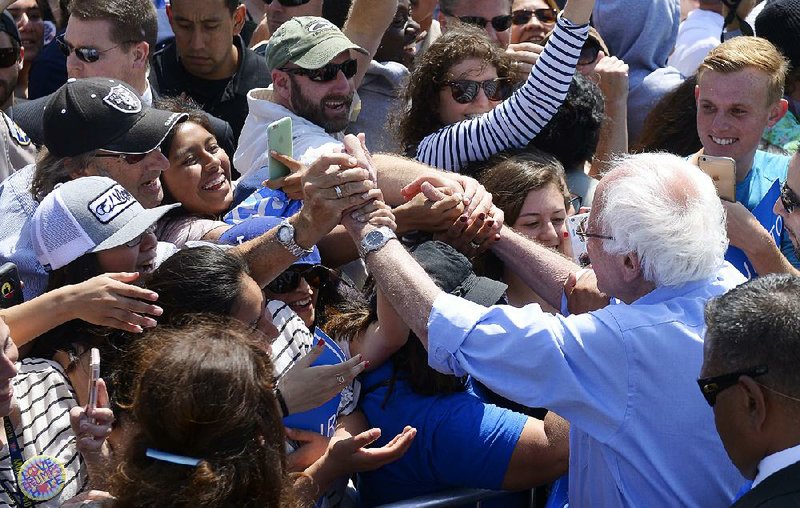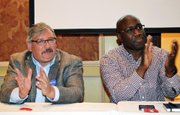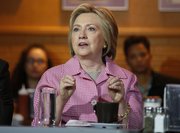WASHINGTON -- Democratic officials have rejected presidential hopeful Bernie Sanders' request to remove two high-profile Hillary Clinton supporters from leadership positions at the party's summer convention.
FULL ELECTION COVERAGE
In a letter sent Friday to party officials, lawyers for Sanders, a senator from Vermont, said the appointments of former Massachusetts Rep. Barney Frank and Gov. Dannel Malloy of Connecticut violated party rules. Frank is to co-lead the rules committee and Malloy the platform committee.
In the letter, Sanders' lawyer Brad Deutsch said both men have been "harsh, vocal critics of Sen. Sanders, and equally active supporters of his challenger, Hillary Clinton." Frank has called Sanders "outrageously McCarthyite" for his suggesting that Clinton would be influenced by her speaking fees from Wall Street; Malloy has led efforts among Clinton allies to attack Sanders' record on gun control.
Under convention rules, Deutsch said in the letter, their open criticism of Sanders made them unfit to co-lead the committees.
"Their criticisms of Sen. Sanders have gone beyond dispassionate ideological disagreement and have exposed a deeper professional, political and personal hostility toward the senator and his campaign," Deutsch wrote. "The chairs therefore cannot be relied upon to perform their convention duties fairly and capably while laboring under such deeply held bias."
Democratic officials replied Saturday morning with a letter from Jim Roosevelt, a retired health insurance executive, and Lorraine Miller, who head the party's permanent rules and bylaws committee. They said the appointments did not violate party rules, and that Sanders had not demonstrated otherwise. The question of Frank's and Malloy's qualifications had been settled in January, when they were first appointed, Miller and Roosevelt wrote, and there is no mechanism to revisit it.
"We are compelled to dismiss it," they said in the letter.
Frank has been a critic of Sanders' personality and tactics.
"The way he's been acting now is a demonstration of why he's had no support from his colleagues," Frank told The Washington Post this month. "The problem that most committed liberals have had with Sen. Sanders is that we don't think his approach is effective. It's a self-righteous view that if you just say something loudly enough, you win."
Frank and Malloy were chosen in January by Rep. Debbie Wasserman Schultz of Florida, the chairman of the Democratic National Committee, who has clashed with Sanders over her scheduling of primary debates and, more recently, his supporters' attacks on other Democratic leaders.
Sanders' efforts to disqualify the Clinton backers mark his latest bid to ensure that his ideas and supporters are well-represented at the convention in July. And his battles with Clinton supporters have become increasingly bitter.
This month, Sanders supporters protested a state party meeting in Nevada, with some threatening the party's chairman there in a dispute over the selection of convention delegates.
campaign dilemmas
While Clinton enjoys many demographic advantages heading into the fall, key Democrats say they are growing worried that her campaign has not determined how to combat her unpredictable Republican rival, to whom criticism seldom sticks.
Clinton is pressing ahead with a conventional campaign, echoing the themes used against the 2012 Republican nominee, Mitt Romney. But Donald Trump, who has clinched the Republican nomination, is running a jarringly different crusade: accusing her husband, former President Bill Clinton, of rape; proposing that the country torture detainees; and suggesting that South Korea and Japan be permitted to develop nuclear arms.
"The guy's a maniac," John Burton, chairman of the California Democratic Party, said about Trump. Referring to a prominent 1964 political attack ad, he said, "You could run the old [Lyndon B. Johnson] ad against [Barry] Goldwater, with, 'Three, two, one,' and a hydrogen bomb blows up with a little girl counting daisies."
Trump faces many hurdles himself, and has stumbled in managing his growing campaign as he shifts toward a general election. But Democrats suggest that the past few weeks have shown that Hillary Clinton and her aides must become more agile and creative against him.
The sense of nervousness prevailed last week when Clinton devoted campaign events across California to hitting Trump for not releasing his tax returns and depicting him as a cold corporate titan who profited off the housing crisis. Such portrayals helped undermine Romney four years ago, yet Clinton's remarks received little coverage in the media. Meanwhile cable channels went live with Trump's recitation of "Crooked Hillary," his nickname for her.
Ken Salazar, a former Colorado senator, said the campaign should draw a sharp contrast between Trump's shortcomings and Clinton's potential to be "the most qualified person to be president in our lifetime."
"The campaign needs to expose Donald Trump as the opposite -- selfish, egomaniac, divisive and unqualified to be president," Salazar said in an email.
Having overcome a multimillion-dollar "Never Trump" campaign aimed at blocking him from the Republican nomination, Trump is now benefiting from a wave of GOP donors, party leaders, voters and conservative groups that are uniting under a new banner: "Never Hillary."
"Nothing unites Republicans better than a Clinton," said Scott Reed, a political strategist for the U.S. Chamber of Commerce who has advised previous GOP campaigns. While Reed said there remain "many unknowns" about Trump, he added that "the knowns about Hillary are very powerful motivators to Republicans."
Thanks to Republicans' deep disdain for the Democratic front-runner, Trump is piling up those kinds of GOP endorsements.
Sen. Marco Rubio of Florida, who called Trump a dangerous "con artist" during his own failed presidential campaign, now says he's willing to get involved in the general election to stop Clinton.
"If you can live with a Clinton presidency for 4 years, that's your right," Rubio wrote on Twitter Friday. "I can't and will do what I can to prevent it."
Later in the day he reiterated on Twitter that his assistance should not be viewed as pro-Trump. "I said I would be 'honored' to help party beat Hillary," he wrote.
Information for this article was contributed by Julie Bykowicz, Julie Pace staff members of The Associated Press; by Nicholas Confessore, Amy Chozick, Alexander Burns and Jonathan Martin of The New York Times; by David Weigel of The Washington Post.
A Section on 05/29/2016



